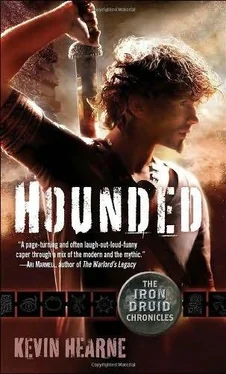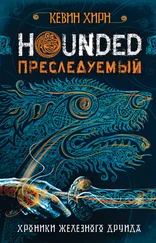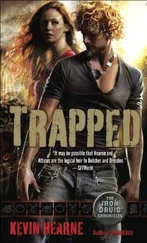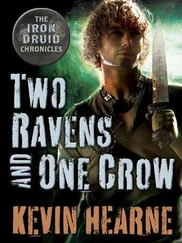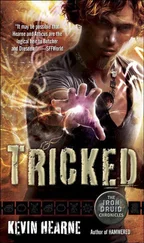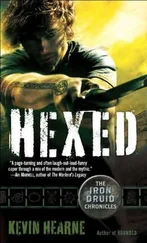“Why does the pack member work with the vampire? He should have killed the foul creature on sight.”
I shrugged. “We are not in the Old World anymore. This is a new age and a new place, and they both happen to have a common enemy.”
Flidais cocked her head sideways and waited for me to name said enemy.
“And that would be Thor, the Norse god of thunder.”
“Oh.” Flidais relaxed somewhat. “I can understand that, then. He could make a salamander team up with a siren. What did he do to them?”
“Helgarson won’t tell me, but it must have been bad. His fangs pop out if you just say ‘Thor’ aloud, and he hunts carpenters simply because they use hammers. As far as Magnusson and Hauk go, Thor killed some of their pack members ten or so years ago.”
“This Magnusson is a werewolf too?”
“Aye, he’s the alpha. Hauk is his second.”
“Did Thor have cause to attack them?”
“Hauk says they were on holiday in the old forests of Norway and it was nothing more than a capricious whim on Thor’s part. Eight precisely aimed lightning strikes out of a sky that had been clear moments before. Couldn’t possibly have been a freak occurrence.” Silver isn’t the only thing that can kill werewolves: Humans simply don’t have access to weapons like bolts of lightning, which fry critters before they can heal.
Flidais was silent for a time and regarded me intensely.
“This desert seems to attract an unusual collection of beings.”
I merely shrugged again and said, “It is a good place to hide. No easy access from the Fae planes, as you know. No gods stomping about, besides Coyote and the occasional visitor like yourself.”
“Who is Coyote?”
“He’s a trickster god of the natives. There are several versions of him running around all over the continent. He’s a nice lad; just don’t make any wagers with him.”
“Isn’t the Christian god prominent here?”
“The Christians have such muddled ideas of him that he usually can’t take shape beyond the crucifix form, and that isn’t much fun, so he rarely bothers. Mary will appear more often, though, and she can do some pretty awesome stuff if she feels like it. Mostly she sits around looking beatific and full of grace. Keeps calling me ‘child,’ even though I’m older than she is.”
Flidais smiled and crawled back into bed with me, vampires forgotten. “When were you born, Druid? You were already old for a mortal when first I met you.”
“I was born in the time of King Conaire Mor, who reigned for seventy years. I was nearly two hundred when I stole Fragarach.”
She threw a leg across my body and then sat up so that she knelt astride me. “Aenghus Óg thinks Fragarach is rightfully his.” Her fingers began to trace curling patterns on my chest, and I stopped her by covering her hand with mine, with seeming affection. It wouldn’t do to have her put a binding on me. Not that I thought she would; it was merely my customary paranoia.
“The people here,” I said, “have a saying: Possession is nine-tenths of the law. And I have possessed it for far longer than any other being, including Manannan Mac Lir.”
“Aenghus Óg cares nothing for mortal sayings. He thinks you have stolen his birthright, and that is all that matters to him.”
“His birthright? Manannan is his cousin, not his father. It’s not like I stole his personal family heirloom. Besides, if it truly mattered to him, then he would have come to get it himself by now.”
“You have not stayed long enough in one place to make it practicable.”
I looked at her with raised eyebrows. “Is that all it takes to finally make this end? Just stay still?”
“I would think so. He will send surrogates after you first, but if you defeat them, he will eventually have no option but to come after you himself. He would be pronounced a coward otherwise and banished from Tír na nÓg.”
“I will stay still, then,” I said, and smiled up at her. “But you can move if you like. May I suggest a gentle rocking motion?”
Located just north of the Phoenix Zoo, Papago Park is an odd formation of isolated hills surrounded by teddy bear cholla, creosote, and saguaro. The hills are steep red rock and riddled with holes, fifteen-million-year-old remnants of ancient mudflows that petrified and eroded over the ages. Now the hills are playgrounds for children in one part of the park, a challenging day climb in some others, and, in a fenced-off area on zoo property, home to a score of bighorn sheep. These last can be viewed—occasionally, if they deign to show themselves—from a part of the zoo called the Arizona Trail. But even then the viewers may be forced to use binoculars to see them well, because it is not an exhibit so much as a tiny preserve, where the sheep are left largely to themselves and undisturbed—that is, until Oberon and I started terrorizing them.
When I hunted with Oberon, I took the form of a wolfhound with a red coat shot through with streaks of white, slightly taller in the shoulder than Oberon and with dark markings on the right side reminiscent of my tattoos. If I had gone out there with a bow and let Oberon flush them for me, it would have been far simpler but far less satisfying for both of us. Oberon wanted to bring them down in the “old way,” never mind that wolfhounds were bred to chase down wolves in the forest and take out charioteers on the battle plain, not leap around rocky hills after nimble-footed rams.
The reason the sheep were so hard to bring down was that the terrain was steep, unkind to our paws, and a tumble from the rocks would probably land us in a cactus—and anyone who’s ever tried to tangle with a teddy bear cholla knows there’s a whole lot more bear than teddy to it. The conditions would simply not let us open up full bore and catch up to them.
When we got to the park, Oberon was ready to kill just about anything that moved. He’d been trying to intimidate Flidais’s stags and found that they were not scared of him in the least, and it was practically making him rabid. I had overheard snatches of their conversation as we rode along in Flidais’s chariot:
he told them.
they taunted him. Oh ho!
Oberon growled at them and bared his teeth, and I told him to hush, doing my best to hide my amusement. Oh, was he ever mad. Calling a giant like him a runt? They really knew how to push a dog’s buttons.
Flidais asked me where she should park her chariot, and I suggested she leave it by Hunt’s Tomb, a small white pyramid incongruously erected on one of the hills as the final resting place of Arizona’s first governor. It was fenced off from the rest of the park, but the stags simply leapt over it, jerking the chariot abruptly behind but landing gracefully on the other side through some of Flidais’s magic.
one of the stags teased.
Oberon simply growled in response, far past the point of vocalizing. We got out of the chariot, and he barked at them once before I brought him to heel.
“We are after sheep tonight,” I reminded him.
he replied as the stags snorted their laughter.
“Get yourself ready, Druid,” Flidais said as she slung her quiver over her head.
And so I cleared my head and summoned power through the tattoo that tied me to the earth, drawing strength up from the desert. I fell down on all fours as I bound myself to the shape of a hound.
A Druid’s therianthrophy is nothing like the change of a werewolf, save in the sense that both are magical. One major difference is that I can change shape (or not) at will, regardless of the time of day or the phase of the moon; another is that it’s fairly painless, unlike lycanthropy; yet another is that I can transform into different animals, albeit a limited few.
Читать дальше
